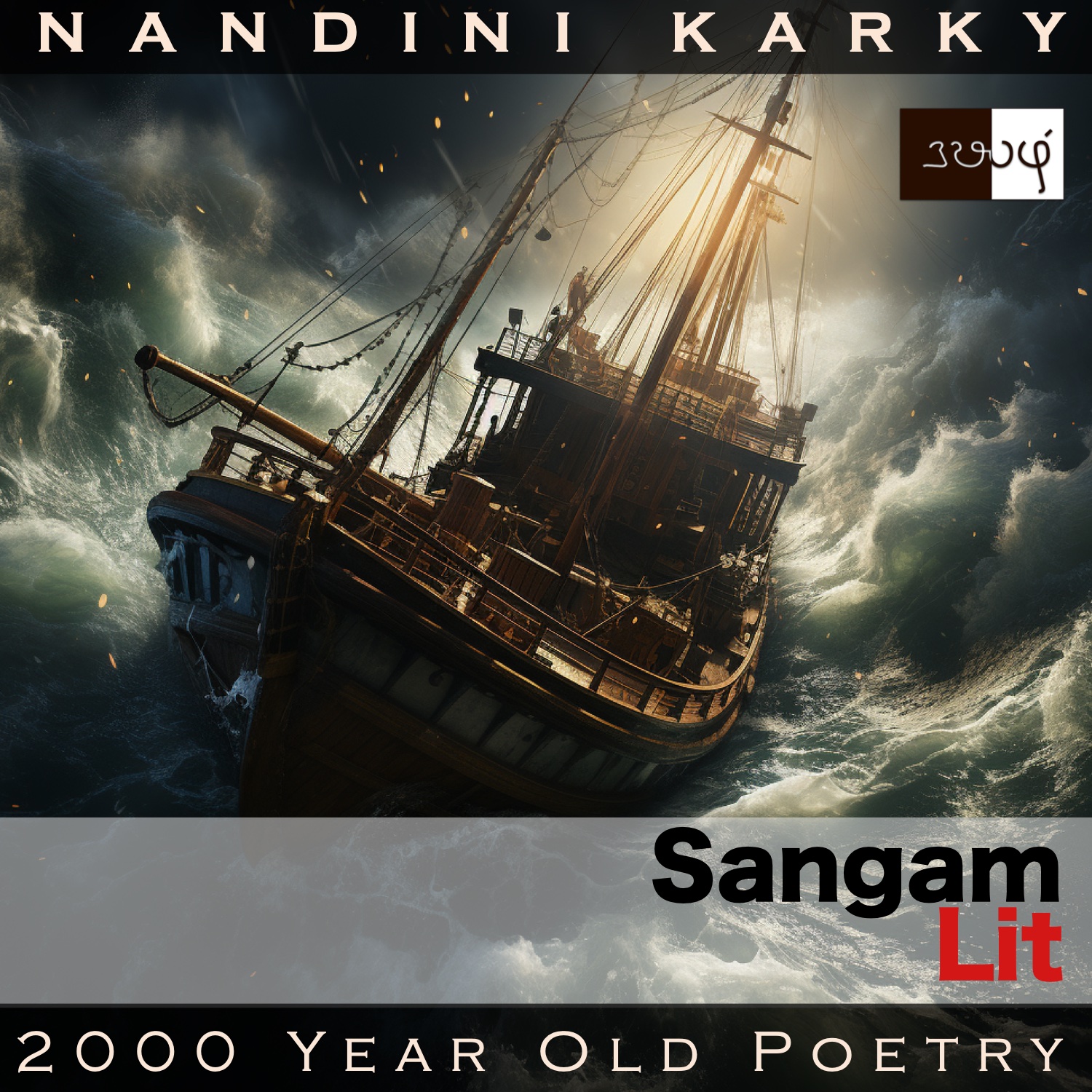Podcast: Play in new window | Download
Subscribe: Apple Podcasts | Spotify | Amazon Music | Android | iHeartRadio | Email | TuneIn | RSS | More
In this episode, we listen to the anguish of a poet, as portrayed in Sangam Literary work, Puranaanooru 238, penned about the Velir King Velimaan by the poet Perunchithiranaar. Set in the category of ‘Pothuviyal Thinai’ or ‘Common Themes’, the verse describes the consequence of the king’s death.

கவி செந் தாழிக் குவி புறத்து இருந்த
செவி செஞ் சேவலும் பொகுவலும் வெருவா,
வாய் வன் காக்கையும் கூகையும் கூடி,
பேஎய் ஆயமொடு பெட்டாங்கு வழங்கும்
காடு முன்னினனே, கள் காமுறுநன்;
தொடி கழி மகளிரின் தொல் கவின் வாடி,
பாடுநர் கடும்பும் பையென்றனவே;
தோடு கொள் முரசும் கிழிந்தன, கண்ணே;
ஆள் இல், வரை போல், யானையும் மருப்பு இழந்தனவே;
வெந் திறல் கூற்றம் பெரும் பேதுறுப்ப,
எந்தை ஆகுல அதற் படல் அறியேன்;
அந்தோ! அளியேன் வந்தனென்; மன்ற
என் ஆகுவர்கொல், என் துன்னியோரே?
மாரி இரவின், மரம் கவிழ் பொழுதின்,
ஆர் அஞர் உற்ற நெஞ்சமொடு, ஒராங்குக்
கண் இல் ஊமன் கடல் பட்டாங்கு,
வரை அளந்து அறியாத் திரை அரு நீத்தத்து,
அவல மறு சுழி மறுகலின்,
தவலே நன்றுமன்; தகுதியும் அதுவே.
Although this poem follows the previous, chronologically, the events in this verse should have happened prior to that of Puranaanooru 237. The poet’s words can be translated as follows:
“On the rounded side of an upturned red urn, perched the male and female, fearless, big-eared, red-headed vulture, along with the loud-mouthed crows and owls, and there, roamed ghosts in company as they wished, in that drylands jungle. The one who loved toddy has parted away thither!
The beauty of royal maiden, shorn of their bangles, fades, and the suffering of singers’ kith and kin soars; Many, many drums roll with their eyes torn; With no one to take care, those mountain-like elephants have lost their tusks; And thus, strong and furious Death has caused all this anguish and made my protector part away. I knew not this would happen when I arrived; Alas! I’m to be pitied, for I came here hoping. What is to become of those who are dependant on me?
On a stormy night, when a wooden vessel capsizes, akin to an agonised person, who cannot speak or see, who gets thrown into the sea, I have been thrown into the borderless edges of the wave-filled waters in this swirling whirlpool of sorrow. Death is far better and would be preferable in this situation!”
Time to delve into the nuances of this verse. The poet starts by bringing before our eyes a burial ground in the drylands region. Here, he points to an upturned red burial urn and the birds perched above it and flying around it. The first of these birds he describes as ‘a red bird with big ears’. On searching, this matches the description of the red-headed vulture, once commonly found in the Indian subcontinent but now in a critically endangered state. The interesting fact I learnt is that this vulture is related to the similar looking ‘Nubian vulture’ found in Africa and Arabia. This puts a question in my mind as to whether this scavenger vulture, known to feed on human remains and spoils left behind by predators, accompanied humans, who migrated from Africa, and then went on to evolve as a new variety in India. That’s a question for evolutionary biologists! Returning, we find these vultures in the company of loud crows and owls too, hovering over the burial urn. The poet reveals his belief in how ghosts too are wandering about in this region without a care. To this harsh drylands, the king, described as one who loves toddy, has left to, the poet connects. Interesting how the epithet of ‘someone who loves his drink’ is rendered as a praise in the past, instead of a subtle censure, as in current times.
Then, the poet goes on to talk about how the bangles of royal maiden are being removed, an ancient custom we have already encountered, and how their beauty reduces just as the suffering of bards’ kith and kin increases. He turns from people to things and talks about torn war drums, and then onto, the king’s elephants, lying about with their tusks broken, with no one to care for them. All this is the action of Death and the poet relates how he never thought this would happen, when he arrived there and laments about what would become of those who were trusting in him back home. And then to etch his emotions, he brings forth a simile of a sight-and-speech-challenged person, who happens to be travelling in a wooden vessel. When storms toss that ship and this person is thrown into the waters, what can they do? This is exactly how he feels, the poet tells us, talking about being thrown into this wave-filled whirlpool of misery because of the king’s death and he concludes by wishing for death in this moment of suffering. While that sounds rather extreme, as we saw in the previous verse, he seems to have recovered and intends to approach other generous patrons to resolve his crisis. So, we can see this as momentary grief, the expression of which, no doubt, helped the poet process the same and move on. Although the poet is only talking about his feelings regarding the king’s death, we are able to go beyond psychology and explore dimensions of wildlife, cultural practices, social life, maritime events and even disability through this illustrative beat from the past!




Share your thoughts...